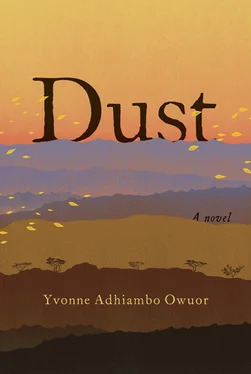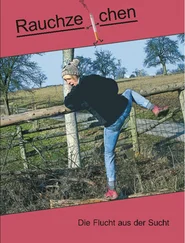Plane drone, slight turbulence.
They bounce. “Better future.” It is a groan in Nyipir’s head. He rubs its tautness. His daughter is staring through the plane’s window. Below, more greenhouses. Flower farms. Ol Donyo Keri — Mount Kenya, a sentinel that is a revelation.
Nyipir shouts, “The mountain!”
The pilot looks back.
“My son … uh … he likes …” Nyipir’s voice cracks.
The pilot scans the horizon and swings the plane right to circumnavigate Mount Kenya. “Batian, Lenana, Macalder,” he intones. The late-afternoon sun has colored the sparse snow crimson. Ajany squashes her face against the windowpane and feels their northward swing in her body. Soon the flamingos appear, on oyster-shell-colored water next to the milk-blue Anam Ka’alakol-Lake Turkana. The pilot says, “There’s Lake Logipi.” They know. This is their territory. Teleki’s volcano, a brown bowl, windy landforms. They pass over Loiyangalani, toward Mount Kulal. Shift northeast, toward Kalacha Goda. They level over the salt flats fringing the Chalbi. Hurri Hills in the dusk light, and then, below, a wide unkempt stripe carved into the land. The plane flies through the layers of time, reveals the hollowed brown rock below from which Ajany and Odidi would survey the rustling march of desert locusts, dry golden-brown pastures where livestock browsed, and they would run after homemade kites, eat cactus berries, and curse one of the land’s visiting winds, which had ripped the kites to shreds.
Wuoth Ogik.
Home.
Ajany crushes the screaming stuck inside her mouth, clutching a secret string and squashing it in her fist. First landing aborted. They veer upward. Ajany scrunches her eyes shut, grits her teeth, and prays they will stay suspended in space and lost to time. Second descent. She is anticipating the crash. The end. The plane evens out, crabs into a soft landing. Dust twirls on their tail.

There were outposts in the world where the sun’s rays burned into lingering phantoms of the British Empire. Babu Paratpara Chaudhari was wiping the jar containing his teeth when through the sunlit door of his angry-green-colored store in a crowd of nine, he saw a Caucasian-looking man elevating a shiny object as he approached the shop. Babu always saw the Caucasians first. It was his way of connecting to an England he had imagined, loved, but never experienced directly. Willful journeying to and displacement in a foreign landscape had turned his Brahmin family into merchants. But clinging to sapless straws of caste, Babu Chaudhari had contented himself with assigning his geographical compatriots the place of the panchamas while he settled into amorphous, self-stranded being in a Not-England African space. Babu Chaudhari’s father’s father had set up supply shops through the Kenyan northern lands and then gone to Ethiopia. He lingers with the memory, wondering, as he often did, why he had not joined the rest of the family after they left East Africa for Rushey Mead, Leicester, England, in 1962. He had been left behind to sell the family shops, but when he reached this one, the seventh of seven, a customer and then five more had shown up. He had served each one, intending to close shop at the end of the day. To assure himself that he was only transiting, every January he handcrafted a recruitment notice for a shop manager, which he glued to the door: Salary negotiable. Accommodation and food provided. Only Hindi, Urdu, or Gujarati speakers should apply with certificate of higher education . He had not received one suitable applicant. Forty-six years later he was still in the same place.
A fly hovers over a sack of five-year-old turmeric.
“Shhh. Shhh.” Babu urges the fly away.
He props up his chin.
Babu barely moved. Gout and gallstones. Glowering was his normal expression. It concealed disenchantment. Settling into his tubbiness, he noted the Caucasian man’s carriage — it was proper, the way he felt English posture should be. He frowned at the double-strapped haversack the man carried, relented when he saw it was made of pebble-grain leather and not Chinese plastic. Expensive dark-green army-style cargo trousers, a beige jacket over a loose-fitting cream shirt, all of which, Babu knew, would become red and brown with dyelike dust by the end of that day. The large man was clean-shaven, broad-shouldered, finely muscled, with shaggy dark-gray-flecked hair plastering his forehead. Babu bet to himself that after five days the man would let his beard grow wild. As he waited for the man to speak, his eyes alive, Babu did a mental scan of goods to offload: expired Malariaquin, 1970s curries and spices. He would blend these and hint that the result healed tick fever. If he attached a mantra to the package and proposed that it be consumed while wild sage was being burned, he could imply that this ritual would reveal the image of God. Caucasians appreciated that kind of thing. It would also explain the cost.
Babu chewed on his gums, glared at an aged donkey. Its distressed braying afflicted his days and most of his nights.
Isaiah William Bolton slipped his suddenly dead cell phone into his pocket and strode into the shop, straightening out the creases on his coat, the result of a cramped flight in a four-seater that he suspected was a crop duster. He took in the sardines, garlic, pepper, and Cadbury’s chocolate. A giggle behind him. He turned. Two kohl-eyed women looked back. One of them winked as a camel would — long lashes, slow, blink, blink. Isaiah gave a half-grin. This was definitely a world he could get to know.
“Shhh. Shhhh.” Babu Chaudhari shooed flies and women away, his mouth downturned. Vile, this threat of tainting genealogies.
Babu Chaudhari’s skin was blotched in most of the shades of brown now, but in his prime, he had been cherished for his blond-streaked hair, fair sunburning skin, and almost blue eyes. He was especially fond of his narrow nose — its stern symmetry. From the moment of his emergence from the womb with his golden curls, he had been a favored child, and an instantly desirable prize for families committed to blanching bloodlines.
The visitor speaks: “Afternoon. Could you please tell me how far it is to Kalacha Goda?”
Babu beamed. Definitely English. Dark English, but English nevertheless. “Wery far.” A gnashing of gums.
“How far is very ?”
“Wery, wery, wery far.”
“How would I get there?”
“Fertainly not today, or ewen tomorrow.”
“I see. Do you know where I might get a room for the night, then?”
“Yef.”
“Where?”
“Here.”
“Lovely. A single. How much?”
“For you, free fifty.” He had doubled the room rate. To be fair, if the visitor had been American, he would have added another zero. Moreover, he was offering this man his best space — mostly insect-free, and reserved for “strictly vegetarians only.”
Isaiah pulled out four hundred shillings, eyes transfixed by a jar behind Babu Chaudhari in which teeth were floating.
“No, no, no!” Babu said. “Fay tomorrow.” He tilts his head. A coy smile appeared. He could not wait. “England?”
“Yes!”
“Goot. Goat fless fe queen.… Do you know Mr. Clark — a fentleman — and Mr. Harry, affofiate of fe Royal Feographical Fofiety, who if right now wif uf?”
“Er, don’t think so.”
“Tell me, man, fif frime minifter ve hawe …”
The visitor paused, laid aside political agnosticism, ignored what ethical orientations a second-tier public-school education had implanted in him, leaned over the counter, and for nearly an hour explained the rise and fall and rise and definite future fall of Gordon Brown.
Читать дальше












